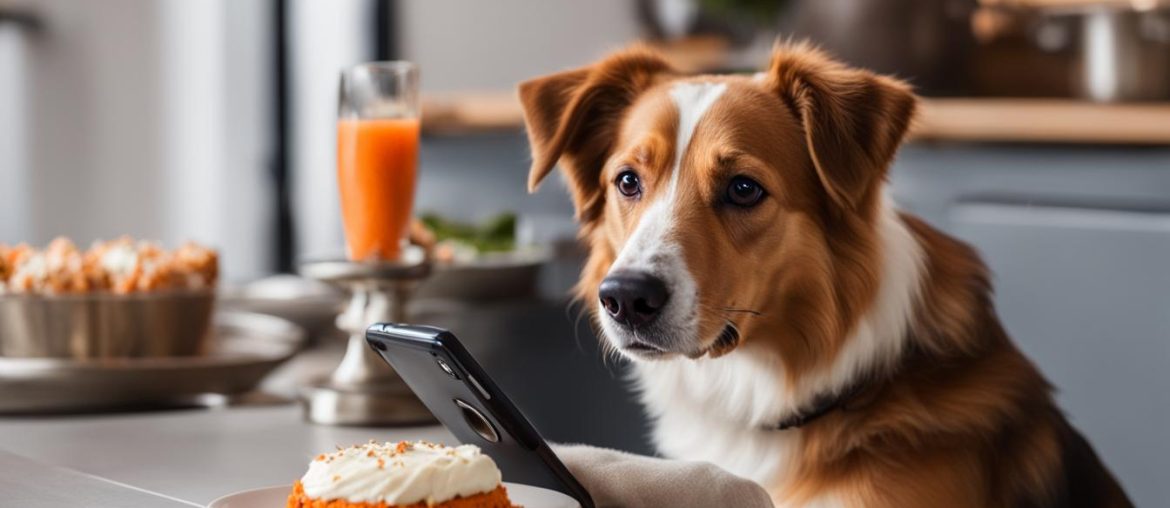As a professional journalist specializing in pet health and nutrition, I often come across questions about what types of food are safe for dogs. Today, I want to address a common query: Can dogs eat carrot cake?
Carrot cake may seem like a harmless treat to share with your furry friend, but according to veterinarians, it is generally not safe for dogs. Why? Well, carrot cake often contains ingredients that can be toxic to dogs, such as sugar, xylitol, and nutmeg. These ingredients can cause upset stomach, diarrhea, and even more serious health issues in our canine companions. That’s why it is important to always check with your veterinarian before giving your dog any new foods, especially those that are considered “people foods.”
Now, you might be wondering, if carrot cake is off-limits, can dogs eat carrots at all? The answer is yes! Carrots are actually a safe and healthy treat for dogs. They are low in calories and packed with essential nutrients, including vitamins A, K, B6, and beta-carotene. Carrots offer numerous health benefits for dogs, such as promoting eye health, improving digestion, and supporting dental health. They are also a great source of fiber, which helps regulate stool and improve the skin and coat of our furry friends. However, while carrots are beneficial, carrot cake is not recommended due to its high sugar content and potential toxic ingredients.
Key Takeaways:
- Carrot cake is generally not safe for dogs to eat due to its toxic ingredients and high sugar content.
- Carrots, however, are a safe and healthy treat for dogs, packed with essential nutrients.
- Raw carrots can be given as a healthy snack, while cooked carrots can provide increased nutritional value.
- Frozen carrots are not recommended, as they can present choking hazards and potentially damage a dog’s teeth.
- While carrots are beneficial, they should be fed to dogs in moderation, as excessive consumption can lead to weight gain and digestive issues.
The Health Benefits of Carrots for Dogs
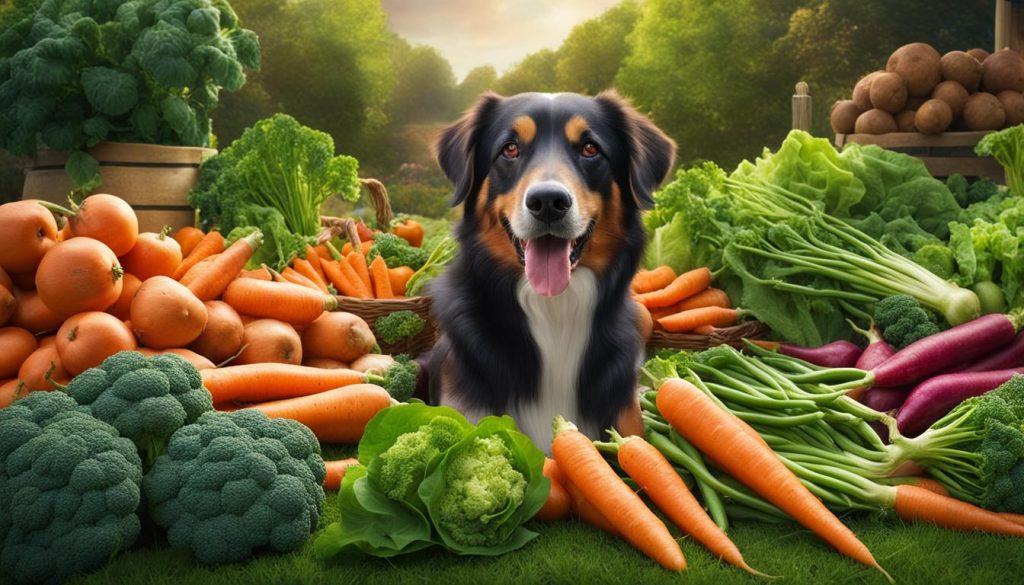
Carrots are a nutritious and dog-friendly vegetable that can provide numerous health benefits for your furry friend. They are rich in essential nutrients and vitamins, making them a great addition to your dog’s diet.
One of the key benefits of carrots for dogs is their high content of beta-carotene and vitamin A, which promotes healthy vision and eye function. These nutrients can help prevent vision-related issues and support overall eye health in dogs.
Additionally, carrots are low in calories and high in fiber, making them an excellent option for dogs who need to maintain a healthy weight. The fiber in carrots can also improve digestion and regulate bowel movements, preventing constipation and promoting a healthy digestive system.
Furthermore, carrots are a natural source of vitamins K and B6, which contribute to a strong immune system and overall well-being. They also contain antioxidants that can help reduce inflammation and boost the immune system in dogs.
Incorporating carrots into your dog’s diet can also benefit their dental health. The crunchy texture of carrots helps remove plaque and tartar buildup on their teeth, promoting good oral hygiene and fresh breath.
However, it’s essential to note that while carrots are beneficial for dogs, carrot cake should be avoided. Carrot cake often contains high amounts of sugar and potentially toxic ingredients like nuts and spices. These can be harmful to dogs and may lead to digestive issues and other health problems.
The Health Benefits of Carrots for Dogs:
- Promote healthy vision and eye function
- Aid in weight management
- Improve digestion and regulate bowel movements
- Boost the immune system
- Contribute to good dental health
Overall, carrots are a nutritious and dog-friendly vegetable that can provide various health benefits for your canine companion. Whether raw or cooked, carrots are a safe and tasty treat option for dogs. However, it’s important to feed them in moderation and consult with your veterinarian before introducing any new foods into your dog’s diet.
Can Dogs Eat Raw Carrots?
Raw carrots are a healthy and nutritious snack option for dogs. They can be a great alternative to processed treats and are packed with essential vitamins and minerals. Raw carrots are low in calories and high in dietary fiber, promoting good digestion and a healthy weight for your furry friend. They also contain antioxidants that help support the immune system and improve overall canine health.
When feeding raw carrots to your dog, it is important to wash them thoroughly to remove any dirt or pesticides. You can cut the carrots into bite-size slices to make it easier for your dog to chew and digest. For smaller dogs or puppies, it is recommended to cut the carrots into smaller pieces to prevent choking hazards. Raw carrots can be served as a standalone snack or added to your dog’s regular meals to enhance their nutritional intake.
It is important to note that while raw carrots are generally safe for dogs, some dogs may have difficulty digesting them. If you notice any gastrointestinal issues such as diarrhea or vomiting after feeding your dog raw carrots, it is best to consult with your veterinarian for further guidance. Additionally, always feed raw carrots in moderation and consider your dog’s individual dietary needs and preferences.
| Benefits of Raw Carrots for Dogs | Cautions for Feeding Raw Carrots to Dogs |
|---|---|
|
|
Overall, raw carrots can be a healthy and enjoyable snack for dogs. They provide numerous benefits for your dog’s overall health and well-being when incorporated into a balanced diet. However, it is always important to introduce new foods gradually and monitor your dog’s response. If you have any concerns or questions about feeding raw carrots to your dog, consult with your veterinarian for personalized advice.
Can Dogs Eat Cooked Carrots?
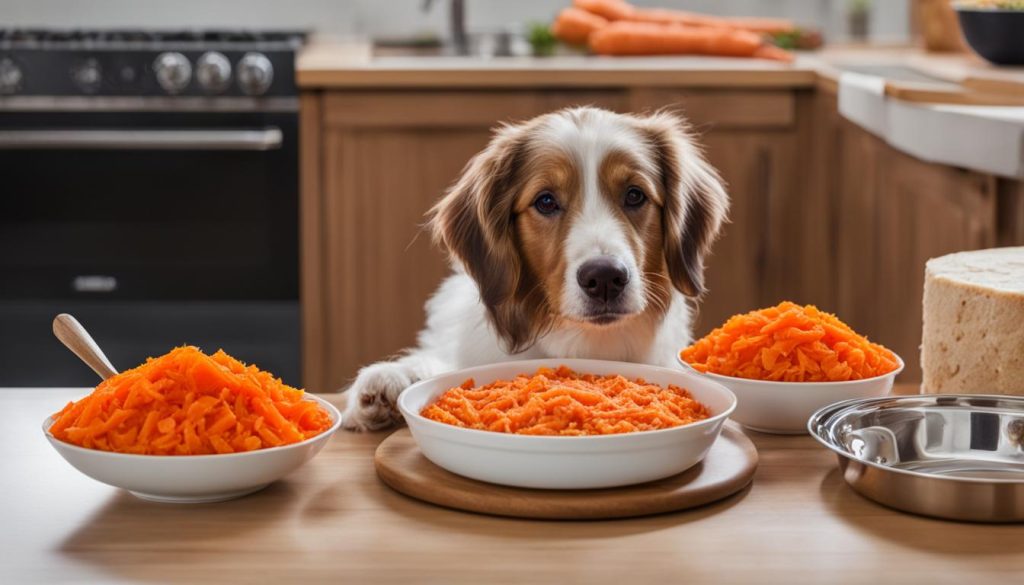
Cooked carrots can be a safe and nutritious addition to a dog’s diet when prepared and served correctly. The cooking process actually enhances the nutritional value of carrots for dogs, making them easily digestible and providing additional health benefits. It is important, however, to avoid adding any seasonings, spices, butter, oils, fats, garlic, or onion to the cooked carrots, as these can be harmful to dogs.
When serving cooked carrots to your dog, it is essential to make sure they are cut into small, bite-size slices to prevent choking. Dogs should always be supervised while eating, especially when consuming cooked or raw vegetables. Additionally, it is crucial to ensure that the cooked carrots are not too hot for your dog, as they can burn their mouth and throat.
While cooked carrots can be a healthy treat for dogs, they should be fed in moderation. It is important to remember that treats, including cooked carrots, should only comprise 10% of a dog’s daily caloric intake. The remaining 90% should come from a well-balanced dog food that meets all of their nutritional needs. Feeding excessive amounts of cooked carrots or any treat can lead to weight gain and potential health issues.
Benefits of Cooked Carrots for Dogs
The nutritional benefits of cooked carrots for dogs are numerous. They are an excellent source of vitamins A, K, and B6, as well as beta-carotene. These vitamins support overall health and well-being in dogs, contributing to healthy eyesight, strong bones, and a robust immune system. Cooked carrots also provide dietary fiber, which aids in digestion and helps maintain a healthy weight. Additionally, the natural antioxidants found in carrots help protect against cell damage and promote optimal canine health.
| Benefits of Cooked Carrots for Dogs |
|---|
| Vitamins A, K, and B6 |
| Beta-carotene |
| Dietary fiber |
| Antioxidants |
In summary, cooked carrots can be a healthy and tasty addition to your dog’s diet when prepared and served properly. They offer a variety of nutritional benefits and can be a great alternative to processed treats. However, always remember to feed cooked carrots to your dog in moderation and consult with your veterinarian if you have any concerns about their dietary needs or specific health conditions.
Can Dogs Eat Frozen Carrots?
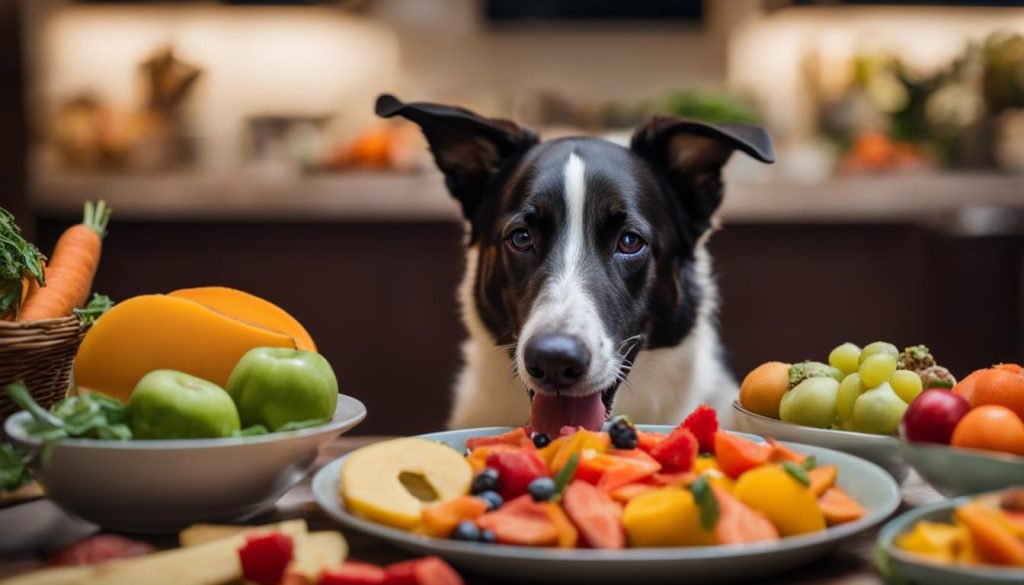
When it comes to frozen carrots, it is not recommended to feed them to dogs as a treat. Frozen carrots can present a choking hazard, especially for smaller dogs or puppies. Additionally, the texture of frozen carrots can be hard and may potentially damage a dog’s teeth. It is always best to serve carrots to dogs in their raw or cooked form, which are safer and more easily digestible options.
Frozen carrots may seem like a convenient option, but it is important to prioritize the safety and well-being of our furry friends. Instead, consider washing and cutting fresh carrots into small slices. These raw carrot slices are not only a healthy and nutritious snack but also help promote dental health and provide dogs with essential vitamins and minerals.
To ensure the utmost safety and enjoyment for your dog, always supervise them when they are eating carrots or any other treats. It is also crucial to consult with your veterinarian before introducing any new foods into your dog’s diet, including carrots.
Table: Comparison of Carrot Treat Options for Dogs
| Treat Option | Safety | Nutritional Value | Serving Recommendation |
|---|---|---|---|
| Frozen Carrots | Not recommended | May present a choking hazard and damage teeth | Do not serve |
| Raw Carrots | Safe | High in essential vitamins and minerals | Wash, cut into small slices, and serve |
| Cooked Carrots | Safe | Increased nutritional value | Cook, cut into bite-size slices, and serve plain |
Remember, while carrots can be a healthy addition to a dog’s diet, it is crucial to feed them in moderation and in the appropriate form. By following these guidelines, you can ensure that your furry friend enjoys the benefits of carrots while staying safe and healthy.
Carrots and Canine Diet
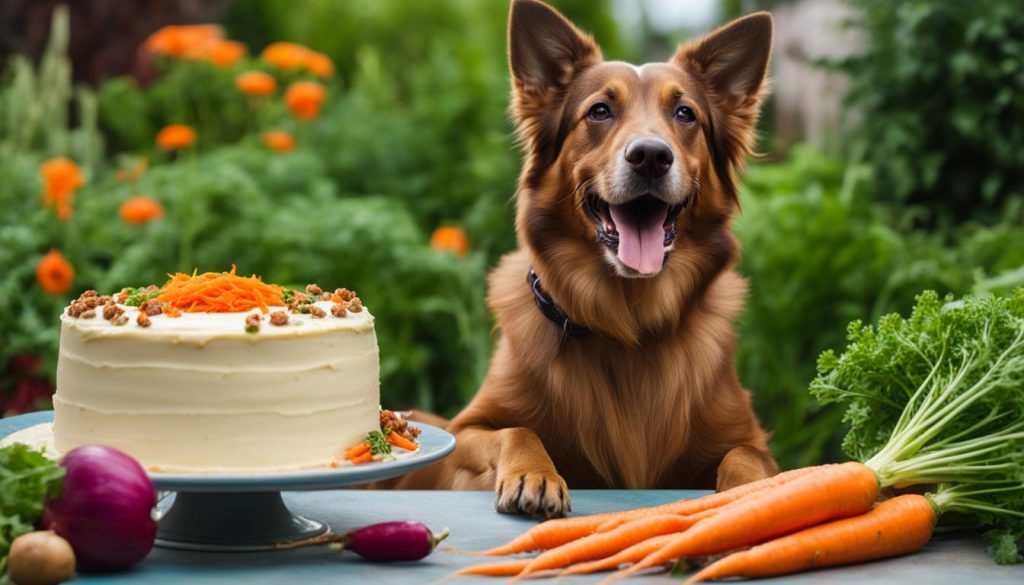
When it comes to incorporating carrots into a dog’s diet, it’s important to strike the right balance. While carrots offer numerous health benefits for dogs, they should be fed in moderation and as part of a well-balanced canine diet. Treats, including carrots, should only make up 10% of a dog’s overall diet, with the remaining 90% coming from a nutritionally balanced dog food.
Feeding excessive amounts of carrots or any treat can lead to weight gain and other health issues. It’s crucial to follow feeding portions based on a dog’s weight and breed size. Consulting with a veterinarian to determine the appropriate amount of carrots for your dog is always a good idea.
When giving carrots to dogs, it’s best to serve them in a safe and appropriate form. Raw carrots can be cut into small, bite-size slices and served as a healthy snack or treat. Cooked carrots can also be given to dogs, as long as they are plain and not seasoned with harmful ingredients like butter, oils, fats, or spices. Additionally, it’s important to avoid garlic and onion, as they are toxic to dogs.
The Benefits of Carrots in a Dog’s Diet
- Low in calories and high in essential nutrients
- Promote eye health and improve digestion
- Support dental health and provide beneficial fiber
- Regulate stool and improve skin and coat health
By incorporating carrots into a dog’s diet in a controlled manner, pet owners can take advantage of the many health benefits this vegetable offers while ensuring the overall nutritional balance of their furry friend’s diet.
Table: Sample Carrot Treat Guidelines
| Treat | Portion Size | Frequency |
|---|---|---|
| Raw Carrot Slices | 2-3 small slices | 2-3 times per week |
| Cooked Carrot Slices | 2-3 small slices | 2-3 times per week |
| Carrot Pieces in Kong Toy | 1-2 pieces | 1-2 times per week |
| Carrot Puree Frozen as Popsicle | 1-2 popsicles | 1-2 times per week |
Remember, it’s always best to consult with a veterinarian before making any changes to your dog’s diet or introducing new treats. They can provide personalized recommendations based on your dog’s specific needs and dietary requirements.
Potential Risks of Carrots for Dogs
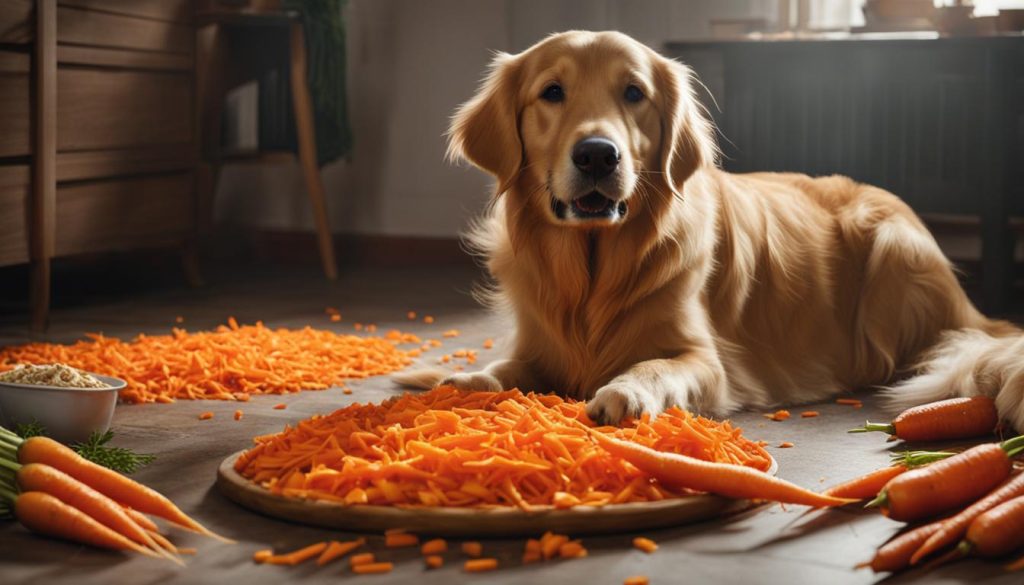
While carrots are generally safe and healthy for dogs, it’s important to be aware of potential risks associated with feeding them to your furry friend. Understanding these risks can help you make informed decisions about your dog’s diet and ensure their well-being.
Sugar Content
Carrots contain a significant amount of sugar, which can be a concern for dogs with certain health conditions. Dogs with diabetes or those who are obese should avoid consuming large amounts of carrots. It’s always best to consult with your veterinarian to determine if carrots are suitable for your dog’s specific dietary needs.
Choking Hazard
Large pieces of carrots can pose a choking hazard, particularly for small dogs or puppies. To prevent choking, it’s recommended to cut carrots into small, bite-size slices before serving them to your dog. This ensures they can easily and safely consume the carrots without the risk of choking or discomfort.
Food Sensitivities or Allergies
Just like humans, dogs can have food sensitivities or allergies to certain ingredients. While it’s rare, some dogs may have an adverse reaction to carrots, resulting in vomiting or diarrhea. If you notice any unusual symptoms after feeding your dog carrots, it’s best to consult with your veterinarian to determine if they have a sensitivity or allergy to this vegetable.
Table: Potential Risks of Carrots for Dogs
| Potential Risks | Explanation |
|---|---|
| Sugar Content | Carrots contain a significant amount of sugar, which can be problematic for dogs with diabetes or obesity. |
| Choking Hazard | Large pieces of carrots can pose a choking hazard, especially for small dogs or puppies. |
| Food Sensitivities or Allergies | Some dogs may have food sensitivities or allergies to carrots, resulting in vomiting or diarrhea. |
While the risks associated with feeding carrots to dogs are relatively minimal, it’s important to be cautious and informed. By understanding these potential risks and monitoring your dog’s response to carrots, you can ensure their safety and well-being while incorporating this nutritious vegetable into their diet.
How to Safely Feed Carrots to Dogs
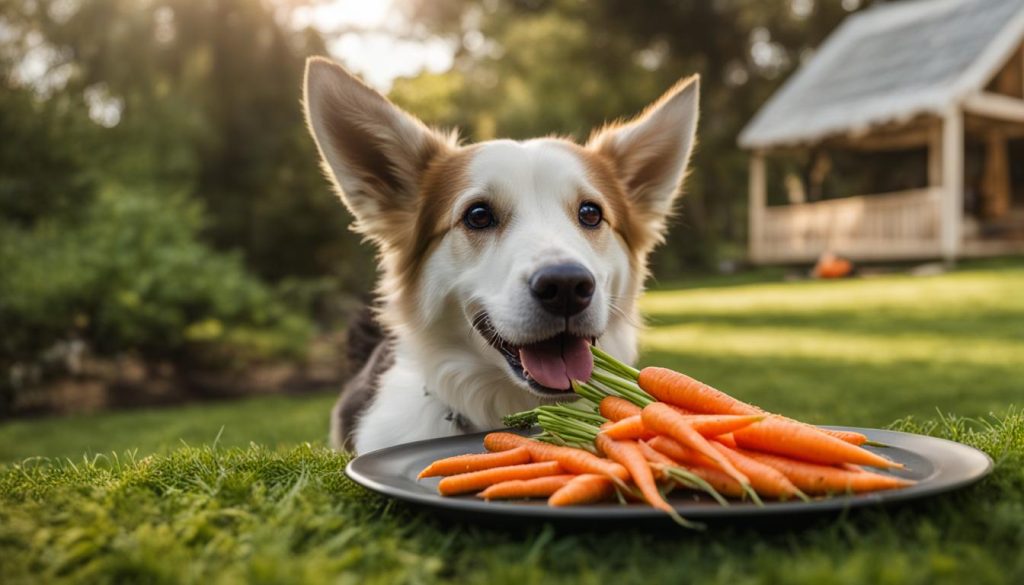
When it comes to feeding carrots to your dog, there are a few important steps to follow to ensure their safety and enjoyment. Whether you choose to serve raw or cooked carrots, it is essential to prepare them properly to avoid any potential risks. Here are some guidelines to help you safely feed carrots to your dog:
- Wash the carrots thoroughly: Before cutting or cooking the carrots, it is crucial to wash them thoroughly to remove any dirt or pesticides. This step ensures that your dog will consume clean and safe carrots.
- Cut the carrots into small slices: To prevent choking hazards, especially for small dogs or puppies, it is recommended to cut the carrots into small, bite-size slices. This makes it easier for your dog to chew and digest the carrots.
- Avoid adding any ingredients: When serving cooked carrots to your dog, it is essential to serve them plain, without adding any butter, oils, fats, seasonings, or spices. These additional ingredients can be harmful to dogs and should be avoided.
Additionally, you can prepare carrots for your dog in various ways, depending on their preference. You can boil, steam, bake, or grill the carrots before serving them. Just make sure they are not too hot for your dog to avoid any burns. By following these steps, you can safely incorporate carrots into your dog’s diet and provide them with a healthy and nutritious snack option.
Table: Benefits of Safely Feeding Carrots to Dogs
| Benefits | Description |
|---|---|
| Promotes dental health | The crunchy texture of carrots helps remove plaque and tartar buildup, promoting good oral hygiene in dogs. |
| Supports digestion | The fiber content in carrots aids in digestion and helps regulate bowel movements, preventing constipation in dogs. |
| Improves skin and coat | The high vitamin A content in carrots contributes to a healthy skin and coat, reducing issues like dryness and itchiness. |
| Provides essential nutrients | Carrots are rich in vitamins and beta-carotene, which are beneficial for overall health and well-being in dogs. |
“Feeding carrots to dogs can be a great way to provide them with a healthy and enjoyable snack option. However, it’s important to remember that carrots should only make up a small portion of your dog’s overall diet. They should be offered as a treat and not as a substitute for a balanced dog food. As with any new food, it’s always a good idea to consult with your veterinarian before introducing carrots or any other food into your dog’s diet.”
Wrapping Up
To summarize, it is important to prioritize the safety and well-being of our canine companions when considering their diet. While carrots are generally safe and healthy for dogs, it is crucial to avoid feeding them carrot cake. Carrot cake contains ingredients such as sugar, xylitol, and nutmeg, which can be toxic to dogs and potentially lead to serious health issues. Always consult with your veterinarian before introducing any new foods into your dog’s diet.
When it comes to dogs and carrots, it is best to serve them in their raw or cooked form. Carrots are a nutritious and low-calorie treat for dogs, rich in vitamins and fiber. However, they should be given in moderation as part of a well-balanced diet. Remember, treats, including carrots, should only make up 10% of a dog’s overall diet, with the remaining 90% coming from a balanced dog food.
For the safety and enjoyment of your furry friend, ensure that carrots are prepared appropriately. Raw carrots can be cut into bite-size slices, while cooked carrots should be served without any added ingredients. Always cut carrots into small, easily digestible pieces, and avoid giving large chunks to small dogs or puppies to prevent choking hazards or intestinal blockage. By following these guidelines, you can provide your dog with safe and healthy snacks that they will love.
FAQ
Can dogs eat carrot cake?
No, carrot cake is generally not safe for dogs to eat. It contains ingredients that are toxic to dogs, such as sugar, xylitol, and nutmeg. It is important to always check with your veterinarian before giving your dog any new foods.
Can dogs eat raw carrots?
Yes, dogs can eat raw carrots. They can be cut into bite-size slices and served as a healthy snack or treat. Just make sure to rinse them thoroughly before serving.
Can dogs eat cooked carrots?
Yes, dogs can eat cooked carrots. Cooking carrots can actually increase their nutritional value for dogs. However, it is important to avoid adding any butter, oils, fats, seasonings, or spices to the cooked carrots.
Can dogs eat frozen carrots?
No, frozen carrots are not recommended as a treat option for dogs. They can present a choking hazard and can damage a dog’s teeth. It is best to serve carrots to dogs in their raw or cooked form.
How much carrots should dogs eat?
Carrots should only make up 10% of a dog’s diet, with the remaining 90% coming from a well-balanced dog food. Feeding excessive amounts of carrots or any treat can lead to weight gain, digestive issues, and other health problems.
Are there any risks in feeding carrots to dogs?
While carrots are generally safe for dogs, there are some potential risks. They contain a significant amount of sugar, so they should not be given to dogs with diabetes or those that are obese. Large pieces of carrots can pose a choking hazard or lead to intestinal blockage, especially for small dogs or puppies. Some dogs may also have food sensitivities or allergies to carrots.
How should I serve carrots to my dog?
It is important to wash the carrots thoroughly before cutting or cooking them. Raw carrots can be cut into small slices and served as treats or added to a dog’s food bowl. Cooked carrots should be cut into small, bite-size slices and served plain, without any added ingredients.


